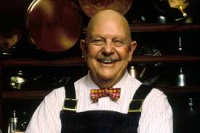James Beard
Contents
[hide]Country
United States
Birth - Death
1903 - 1985
Occupation
Chef
Description
James Beard is a legendary chef and cookbook author who helped establish the culinary arts as a global industry. He established the James Beard awards in the culinary field, being annual awards which recognize the accomplishments of food professionals. He laid the foundation for the cultural food revolution that we know today.
Born on the west coast of the United States, James Beard acknowledged that his love and appreciation for all things food began as early as age two or three. At the time, he said that he was exposed to foods of various cultures and was fascinated by its preparation and taste. This exposure was through simple cooking and pleasures of everyday life, a style that he would present and defend throughout his lifetime.
Unable to complete high school, Beard travelled to France in the 1930s and was exposed to their cuisine and cooking styles. He trained for voice and theatre until he returned to the United States in 1927. Unable to find employment in this field, Beard opened a catering company called ‘Hors D’Oeuvre, Inc.’ which catered to the theatre and performing arts groups in New York City. The success of this venture in turn led him to a career of teaching at colleges and to writing popular cookbooks.
His first cookbook Hors D’Oeuvre and Canapés (1940) was an immediate success and put him in the spotlight as a chef. He followed this with a successful television show I Love to Eat, which was the first cooking show ever on television. In 1955 Beard established his cooking school, The James Beard Cooking School to continue his training and education efforts.
Beard’s profile as a cook continued to increase thereafter with the publication of more cookbooks (over 25 in total), television appearances, speaking engagements, and more. Reflective of his business acumen, he was the first chef to endorse and promote food products that reflected the everyday consumption of his audience – mustard, peas, peanuts, soft drinks, and so on. He was nicknamed the ‘Dean of American Cookery’ in 1954 by the New York Times.
In 1981, Beard founded the City Meals-on-Wheels charitable organization which delivers freshly-made meals to homebound elderly people. This organization now provides over 3 million daily meals in cities around the world and is based on the successful integration of nutrition and home social visits.
Beard’s other lasting legacy is the James Beard Awards, given annually by the James Beard Foundation. These awards include annual scholarships to students studying to be future chefs, awards for top chefs and restaurants around the United States, and honours for cookbook authors and restaurant designers. All of these awards are greatly coveted by the recipients and their receipt is largely followed by food aficionados and industry players around the world.
Throughout his life, James Beard acknowledged his homosexuality. In fact, he was expelled from his high school for homosexuality – as a result, he did not receive his degree until they honoured him in 1976. James Beard states in his autobiography that he knew he was gay as early as the age of seven.
Fortunately for him, Beard grew to be a very imposing and gregarious personality that commanded a stage presence. The renowned New York Times food critic, Craig Claiborne, described him as a ‘connoisseur’s connoisseur’. His dominating appearance conveyed his passion for food.
Is James Beard’s background as a gay man that different from many others? Here is a man who had a fond appreciation for good food and wine, an appreciation for the arts, a willingness to give back as a philanthropist, and common sense enough to create a culinary business revolution that grew into today’s behemoth of a global industry. He acknowledged that food became his passion in part because of the regular stigma and isolation caused by his homosexuality. Perhaps a big difference that made his success so enjoyable to him personally was that he acknowledged his homosexuality throughout his lifetime and did not fight it.
See Also
- The LGBTQ Food and Farming Community
- Popular Cookbook Authors Who Are LGBTQ
- Prominent LGBTQ Philanthropists and Donors

